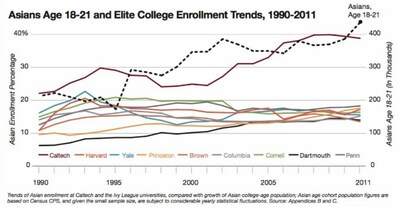ST. PETERSBURG, Fla. , June 5, 2023 /PRNewswire/ — 80-20 calls on the media to fairly report the case, Students for Fair Admissions vs. Presidents and Fellows of Harvard College (“SFFA v. Harvard”)1. Most of the media attention has focused on how the anticipated Supreme Court decision will end affirmative action. This implicitly buys into Harvard’s narrative that it is pro-diversity. However, the media should not lose sight that at its core, SFFA v. Harvard is about ending discrimination against Asian Americans in college admission.
In SFFA v. Harvard’s initial complaint, filed in 2014, the first and central claim, articulated in Count I, alleges that Harvard violates Title VI of the 1964 Civil Rights Act for its “Intentional Discrimination Against Asian Americans.” SFFA sued on behalf of Asian American applicants and future applicants. SFFA’s complaint also discusses Harvard’s “long history of intentionally discriminating specifically against Asian Americans” going back to the 1970s. SFFA devotes 87 paragraphs to a section it entitles, “HARVARD CURRENTLY ENGAGES IN INTENTIONAL DISCRIMINATION AGAINST ASIAN-AMERICAN APPLICANTS.” Throughout the litigation, SFFA focused on Harvard’s discrimination against Asian Americans. And when SFFA appealed to the Supreme Court, it highlighted how Harvard violated the Civil Rights Act “by penalizing Asian-American applicants[.]” (Emphasis added).
Harvard itself implicitly acknowledges that it discriminated against Asian Americans, because since the lawsuit began, Harvard has dramatically increased its admission rate for Asian Americans.
According to this chart from “The Myth of American Meritocracy,” in a 20+-year period, even as the percentage of Asian Americans aged 18-21 in the population doubled, their enrollment, or percentage as part of Harvard’s student body, hovered at 17% +/- 3%.
In 2014, when SFFA filed its lawsuit against Harvard, the Asian American enrollment at Harvard was only 19.7%.
But the latest enrollment figures show that AsAm enrollment is now 29.9%, which reflects a gain of more than 1% per year since SFFA filed its lawsuit.
SFFA also connects this pattern of discrimination against Asian Americans to Harvard’s now well-documented pattern of discrimination against Jews, by using a more holistic admissions process to keep the numbers of Jewish students down.
S.B. Woo, President of 80-20, emphasized, “The point is, Harvard has a history of using ‘holistic’ admissions or ‘diversity’ as a smokescreen to tamp down the numbers of minorities it disfavors. Thus, ending Harvard’s discrimination against Asian Americans is not a blow against diversity, as coverage based on the ‘end of affirmative action’ implies. Rather, the Supreme Court’s decision could very well mean that Harvard and other elite universities finally can no longer use ‘diversity’ as a smokescreen to impose ceilings on groups that they disfavor.”
For all these reasons, when you report the Supreme Court’s decision in SFFA v. Harvard, please make sure you report that the case is about Harvard’s discrimination against Asian Americans, and not just “affirmative action” in the abstract.
1 Students for Fair Admissions, Inc. v. President and Fellows of Harvard College, Case No. 1:14-cv-14176 (U.S. District Court of the District of Massachusetts); Case No. 19-2005 (U.S. Court of Appeals for the First Circuit); 20-1199 (U.S. Supreme Court).
Contact: S. B. Woo, Pres. of 80-20 Educational foundation & Lt. Governor of DE (1985-89) [302-740-0050, [email protected]]
![]() View original content to download multimedia:https://www.prnewswire.com/news-releases/80-20-educational-foundation-calls-for-fair-coverage-of-asian-americans-in-supreme-court-case-301842996.html
View original content to download multimedia:https://www.prnewswire.com/news-releases/80-20-educational-foundation-calls-for-fair-coverage-of-asian-americans-in-supreme-court-case-301842996.html
SOURCE 80-20 Educational Foundation




